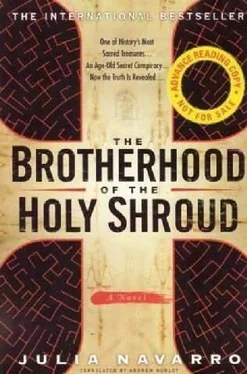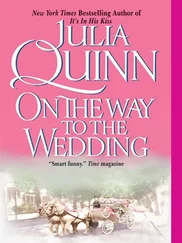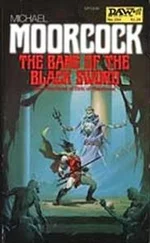"I shall ask you to show me this grave cloth someday, Josar, but I must first seek within my heart to know when it shall be."
They arrived at the palace, where Abgar received them warmly. The queen, at his side, was unable to hide the joy she felt on meeting a friend of Jesus.
"Welcome to you, friend of Jesus and our own," the king greeted Thaddeus. "You may remain in our city as long as you desire, where you shall be our guest and want for nothing. We ask only that you speak to us of the Savior, that you remember his words and deeds, and I, with your permission, shall bid my scribes to listen carefully to your words and write them down so that the men and women of my city and other cities may know the life and teachings of our Lord."
Thaddeus accepted the king's invitation to remain in Edessa, and during all that day and part of the night, with Josar always close by, he recounted to the king and his court the miracles done by Jesus. When it came time to rest, he accepted only a small room with a bed in a house near that of Josar, and he refused, as Josar had upon his return from Jerusalem, to have any slave to aid him.
And as the days and weeks passed, he spoke with the king so that Josar might be his scribe and write down all the things he remembered of the life and words of Jesus.
NEW YORK WAS FLOODED WITH SPRINGTIME sunlight-it was one of those perfect days that came so rarely. The old man tore his eyes from the morning splendor pouring through the windows as he turned to answer the ringing telephone. The communications system in the office was configured for absolute security.
"Yes," he said firmly into the receiver,
"Number one is moving."
"No problems?"
"They're still using the same contacts as before and the same routes, and it all looks clear for them. The police haven't turned up."
"What about number two?"
"He leaves tonight. Number three, tomorrow; he'll be moved directly, in a truck carrying screws and bolts. He's the one who's most on edge."
"I'll speak with our people in Urfa today. We have to know how Addaio is reacting and what he's going to do."
"They might be better off if they never made it back there."
"Let things run their course. We need to know what Addaio does and what he decides. Anything new on his man in the cathedral?"
"His nerves are gone, at least for the moment. But neither the cardinal nor the police suspect him; they're taking him for a good man upset over what happened."
"We have to keep an eye on him."
"Of course. Our people there are on it."
"What about our brother?"
"They've been investigating him. Who he is, what his tastes run to, how he got to where he is today. They've been checking up on me and the others too. The cop, Valoni, is sharp, and he has a good team around him."
"We must be very careful."
"We will be."
"Next week in Boston."
"I'll be there."
The members of the Art Crimes team who'd remained in Turin reconvened the morning after the others returned to Rome.
"Where do we start, dottoressa?"
"Okay, Giuseppe, I think we ought to go talk to the workers again and see if they stick to what they told Pietro. Let's keep digging-where they live, who they live with, what their neighbors think about them, whether there's anything unusual in their lives…"
"That'll take time," Antonino pointed out.
"Yes, which is why Marco asked the chief of the carabinieri here to lend us a couple of men. They know the city better than we do, and they'll know if something we're told is off. Giuseppe can take that angle, and you and I will go back to the cathedral, talk to the employees again, the porter, Padre Yves…"
"Right," Giuseppe said, "but another round of questions might make them nervous, tip them oflf that we're really pushing this."
"If one of them gets nervous, it'll tip us off. I also think we need to interview D'Alaqua."
"He's a big fish. Maybe too big for questioning at this point. If we step on his toes, Rome could come down on us," Antonino warned her.
"I know, Antonino, but we've got to try. I'm curious about him."
"Watch out, dottoressa, don't let that curiosity of yours get us in hot water!" Giuseppe ribbed her.
They split up the work. Antonino would reinter-view the cathedral employees, Giuseppe would talk to the electricians, and Sofia would probe further into D'Alaqua and his interests and work on getting an appointment with him. They would try to finish up in a week, and then they could decide what to do next, assuming they turned up a lead.
Sofia convinced Marco to pull some strings to make sure D'Alaqua talked to her.
Marco had grumbled a bit, but he agreed that the man had to be interviewed. So the director of the Art Crimes Department made a direct request to the Minister of Culture, who told Marco he must be crazy if he thought he was going to let him stick his nose into a company like COCSA and investigate a man like D'Alaqua. In the end, though, Marco convinced the minister that it was essential to speak to the man and that Dottoressa Galloni, a cultured and extremely well-educated investigator, would proceed with infinite discretion.
The minister made an appointment for Sofia with Umberto D'Alaqua for the next day at ten. When Marco told her, she laughed delightedly.
"Boss, you're amazing! I know what this must have cost you."
"Then you know not to screw this up or we'll both be pushing files around in the archives division. Please, Sofia, take it slow and easy, all right? D'Alaqua is not just a big deal here but all over the world-he has investments across Europe, the U.S., the Near East, Asia… You have to handle this guy with kid gloves."
"I'm with Minerva. I've got a hunch about him."
"I hope your hunches don't backfire."
"Trust me."
"If I didn't, you wouldn't be going."
Umberto D'Alaqua's secretary looked more like a top executive than a secretary, no matter how important his employer was. He was a discreedy elegant middle-aged gentleman who introduced himself to Sofia as Bruno Moretti and asked if she'd like coffee while she waited for Signor D'Alaqua to end another meeting.
When she demurred, Moretti excused himself and left her alone. The room in which she found herself was breathtaking. On its walls hung a Canaletto, a Modigliani, a Braque, and a small Picasso.
Absorbed in the Modigliani, Sofia was startled by a voice behind her.
"Good morning, Dottoressa Galloni."
She turned to find herself facing the most attractive man she had ever encountered, studying her with severe yet curious eyes. She felt herself blush, as though she had been caught doing something wrong.
Umberto D'Alaqua was tall and elegantly dressed, probably in his mid-fifties. He radiated self-assurance and strength.
"Good morning. I'm sorry, I was looking at the Modigliani. It's stunning."
D'Alaqua merely smiled slightly. "We'll be more comfortable in my office, Dottoressa Galloni."
Sofia nodded and followed him to a nearby suite of rooms. D'Alaqua's office was comfortable, furnished with contemporary furniture that highlighted the magnificent works of art covering the walls: several da Vinci drawings, a quattrocento Madonna, a Christ by El Greco, a Picasso harlequin, a Miro… On a small table in a corner across from the large desk, the simplicity of a crucifix carved from olive wood drew her attention.
D'Alaqua gestured her toward the couch, and he seated himself in an armchair beside her.
"Well, Dottoressa Galloni, how may I help you?"
Sofia hit him without preamble. "Signor D'Alaqua, we suspect that the fire in the cathedral was not an accident. In fact, we believe that none of the unfortunate events that have occurred in the Turin Cathedral have been accidents."
Читать дальше












